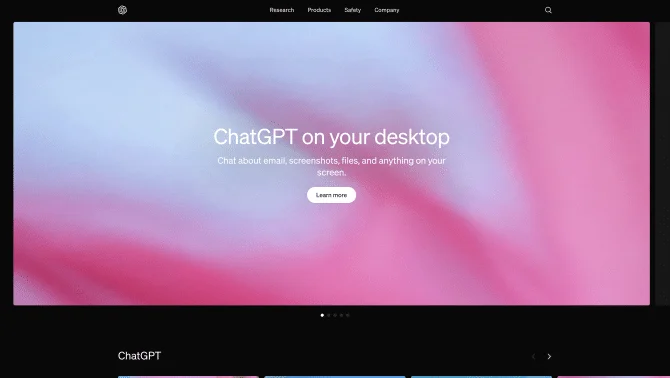Introduction
OpenAI is a leading research and deployment company in the field of artificial intelligence, focusing on developing safe and beneficial AGI. Their suite of AI tools and models are designed to assist in a wide array of tasks, from natural language processing to image generation and code assistance. Users can leverage the power of models like GPT-4o for multimodal interactions, GPT-3.5 Turbo for dialog optimization, and DALL·E for image creation. OpenAI also provides embedding models for search and classification, fine-tuning options for custom model development, and APIs for integrating AI capabilities into applications.
background
Founded in 2015, OpenAI has grown to be a pivotal force in AI research and technology. With a mission to ensure AGI benefits humanity, they conduct groundbreaking research and develop state-of-the-art AI models. Their commitment to safety and ethical use has positioned them as a trusted name in the industry. OpenAI's tools are widely used in academic research, enterprise applications, and creative endeavors.
Features of OpenAI
GPT-4o
An advanced multimodal model with faster response times and improved vision capabilities, suitable for tasks requiring a deep understanding of context.
GPT-3.5 Turbo
An optimized model for dialog with a fast and cost-effective solution for simple tasks, supporting a 16K context window.
Embedding Models
Enables the creation of advanced functionalities such as search, clustering, and classification through embeddings.
Fine-tuning Models
Customize base models with your data for specific tasks, billed only for tokens used in requests.
Assistants API
Facilitates developers to build AI assistants with tools and fees for vector storage and language model token rates.
Image Models
Integrate DALL·E into apps for high-quality image generation and editing, with options for different qualities and costs.
Audio Models
Transcribe speech to text and translate languages with Whisper, and convert text to speech with TTS models.
How to use OpenAI?
To utilize OpenAI's tools, start by identifying the model that suits your needs. Visit the OpenAI platform, log in, and select the model. Explore the pricing options, considering the tokens and batch API discounts. Use the interactive Tokenizer tool to estimate usage and the Playground for real-time token counts. Follow the API documentation for integration into your applications.
Innovative Features of OpenAI
OpenAI's innovation lies in its ability to offer a diverse range of AI models that cater to different needs, from vision to language and audio processing. The introduction of GPT-4o and the continuous improvement of its models demonstrate a commitment to advancing the field of AI.
FAQ about OpenAI
- What are tokens in the context of OpenAI's models?
- Tokens are units of text used for processing in AI models, with 1 token approximately equal to 4 characters or 0.75 words.
- How can I estimate my token usage?
- Use the interactive Tokenizer tool or the Playground feature on the OpenAI platform to estimate the number of tokens in your text.
- Are there discounts available for using the Batch API?
- Yes, using the Batch API can provide a 50% discount on completions returned within 24 hours.
- How do I fine-tune a model for my specific needs?
- You can fine-tune a base model with your training data, and you will only be billed for the tokens used in requests to that model.
- What is the cost of using the Assistants API?
- The cost is based on the chosen language model's per-token input/output rates, plus a fee for tool usage such as vector storage.
- Can I use OpenAI's models for commercial purposes?
- Yes, many users integrate OpenAI's models into commercial applications, subject to the platform's usage policies.
- How can I access the source code for OpenAI's models?
- OpenAI publishes some of its research and model code on its GitHub page, available for review and use.
Usage Scenarios of OpenAI
Academic Research
Use OpenAI's models for text analysis, language translation, and generating academic papers in various fields.
Market Analysis
Leverage the language models for sentiment analysis of market trends and consumer behavior.
Creative Content Generation
Employ DALL·E for creating unique artwork and designs, enhancing creative projects.
Software Development
Utilize the Codex model for code generation and debugging, accelerating development cycles.
Customer Service
Integrate AI assistants using the Assistants API to enhance customer interactions and support.
User Feedback
Users report that OpenAI's models are powerful and easy to integrate, significantly enhancing their applications' capabilities.
Developers appreciate the comprehensive API documentation and the ability to fine-tune models for custom solutions.
Researchers in academia commend OpenAI for providing models that accelerate their work in language processing and data analysis.
Creative professionals have utilized DALL·E to streamline their design process, offering high praise for the generated image quality.
Businesses have reported improved customer satisfaction and efficiency in support operations through the use of AI assistants.
others
OpenAI's commitment to ethical AI deployment and its focus on user accessibility have been highlighted in user feedback, showcasing the company's dedication to responsible technology advancement.
Useful Links
Below are the product-related links, I hope they are helpful to you.
